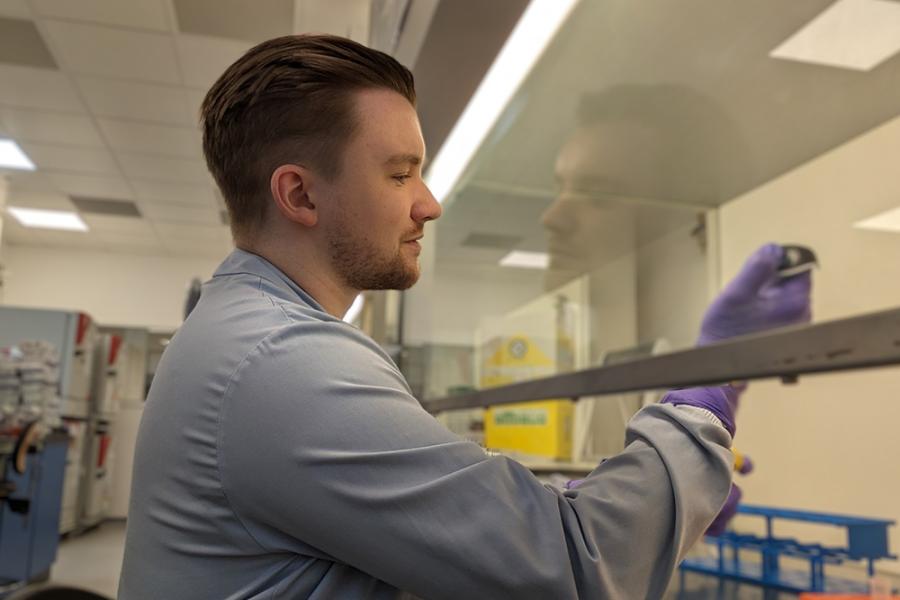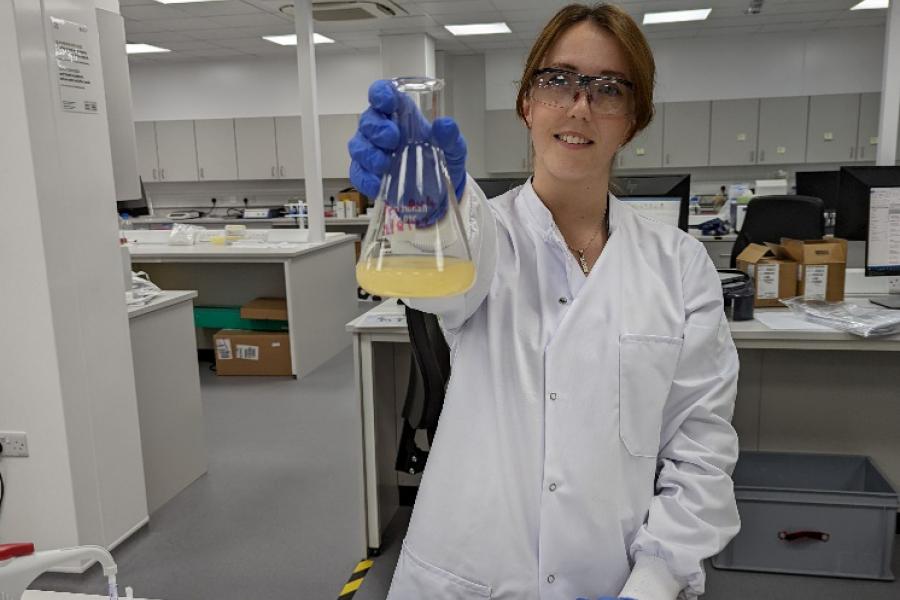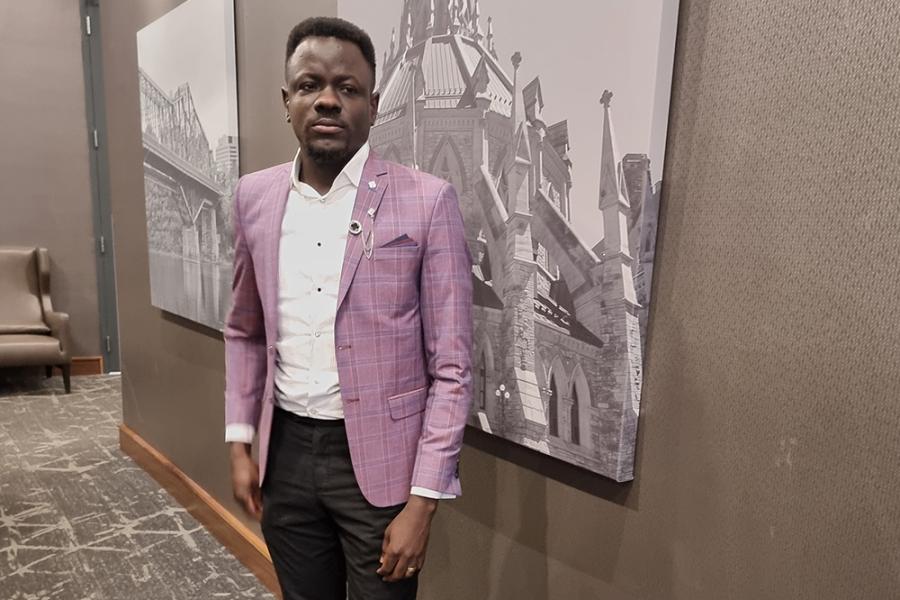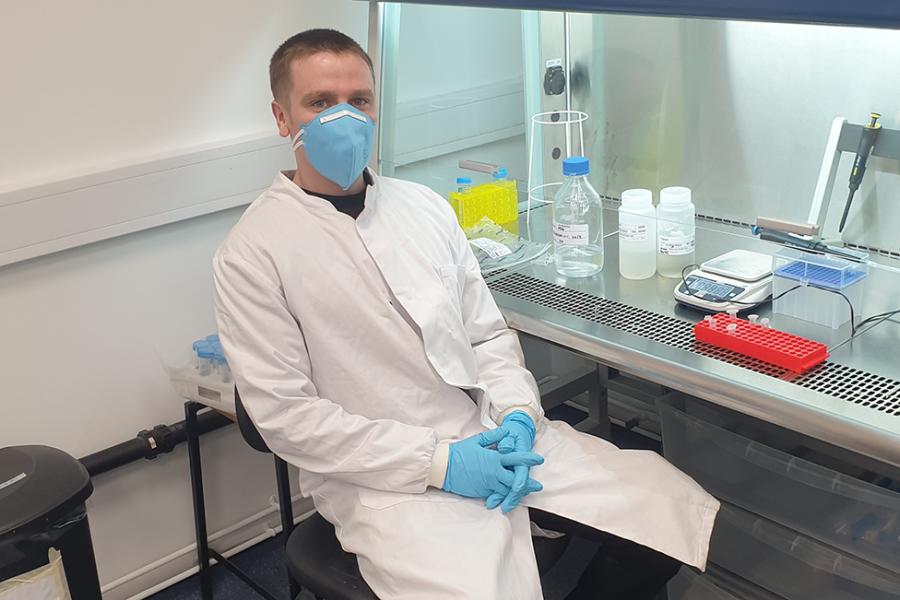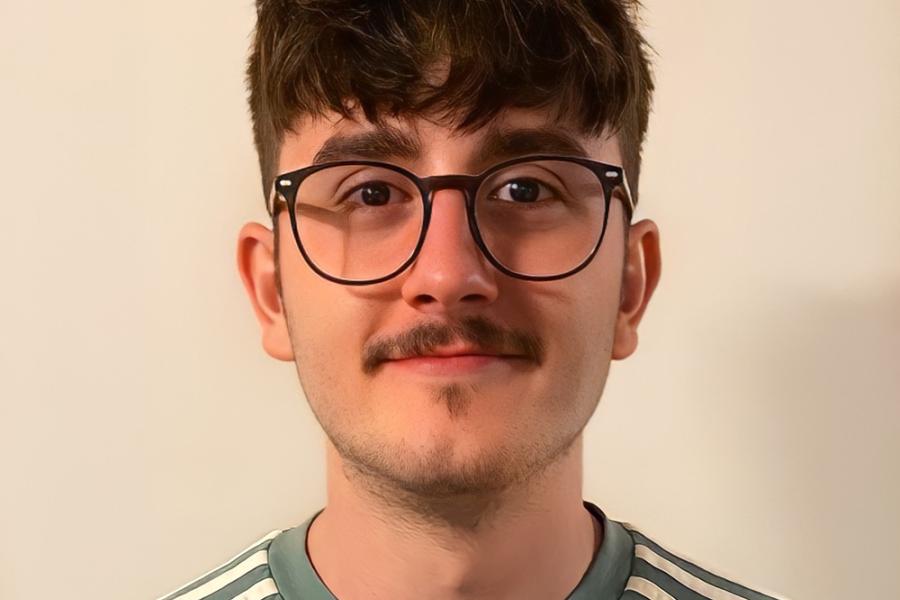What did you do before you started your MRes degree?
Studied for a BSc Biomedical Science at Bangor University.
Why did you decide to do an MRes in Molecular Medicine at Bangor University?
Having been at the university for my undergraduate degree, I was aware of and attracted to the research areas NWCR staff were investigating. Given the positive experience I had with the department during my undergraduate degree, and the opportunity to receive KESS2 funding for the MRes, I decided to remain at Bangor and continue this through to my postgraduate level.
What do you think was most valuable in the course?
Spending ~9 months in the lab gaining both the practical and critical thinking skills necessary for a career in science, either in academia or industry, is invaluable. This has been especially true after the last few years where practical experience has had to take a backseat because of the COVID-19 pandemic and resulting lockdowns.
What was the most challenging aspect of the course? What did you learn from this?
Outside of the specific research area, which I found challenging and rewarding in itself, learning how to organise myself and my experiments with less input from a supervisor was the biggest hurdle that I faced. However, by spending every day in the lab performing experiments and gaining experience, you quickly learn how to plan in advance and fit the pieces of the puzzle that is research together in a way that makes increasingly more sense as the weeks fly by.
Where have you been employed since? What are you doing now?
Straight after completing my MRes, I worked for Abzena, a contract development and manufacturing organisation (CDMO) in the Cell Line Development (CLD) department based in Cambridge, UK. Here I worked on client projects to produce Chinese Hamster Ovary (CHO) cell-lines that express a variety of proteins, such as Antibodies, Fc-Fusion Proteins, and Viral-like Particles, for use in vaccines or therapeutic scenarios. However, I have recently secured a position in the new CLD group at Abcellera in Vancouver, Canada. As part of the team, I will be performing many of the same roles as at Abzena, but with the added opportunity to be a part of the development and setup of a new department at the company, working to develop a new platform cell-line and continue to work in drug discovery and development. At both Abzena and AbCellera, we utilise a large array of advanced automation equipment, from liquid handlers and ddPCR machines, to bioreactors ranging in size from 15mL to 2000L. This allows us to provide purified material to research teams throughout the drug development process up to clinical trials.
How has the course helped you to get where you are now? Which aspect was most important?
The course gave me a huge number of transferable skills which allowed me to start my career in industry at a running pace. While I have been able to utilise all of these since starting in work, the cell culture aspect has really been a boon. A proficiency in mammalian cell culture is a massive advantage when applying for jobs out of university, be it working with stem cell, research, or production cell-lines.
What are your plans for the future?
Currently, my biggest plan is to organise the move to Canada to begin my new job! After that, I aim to continue to progress and learn everything I can about the cell line development process, as well as related areas so that I may eventually reach a more senior role to manage and help others achieve in the field.
What did you do before you started your MRes degree?
I completed my undergraduate degree in Biomedical Science at Bangor University.
Why did you decide to do an MRes in Molecular Medicine at Bangor University?
I wanted to gain independent research skills both within the lab and through literature reviews, to help me prepare for the next steps in my career. I chose to do this at Bangor as I had already built relationships with the course leaders and knew I would be getting a great level of expertise and understanding to support me through the course due to carrying out my undergraduate degree at Bangor.
What do you think was most valuable in the course?
The course provided you with the opportunity to develop your research skills both independently and collaboratively by providing a similar environment to what you would expect from a PhD. I interacted daily with the members of the lab and my supervisor to meet my research goals, gaining their knowledge and expertise along the way.
What was the most challenging aspect of the course? What did you learn from this?
The most valuable lesson I learnt from the course was that you get out what you put in and resilience is the most important skill to develop. Research in most cases doesn’t always go to plan and you will find that in your professional life too. It’s how proactive you are about the changes and challenges you face as well as understanding that it is up to you to find the answers.
Where have you been employed since? What are you doing now?
Since graduating from my MRes in Molecular Medicine I have worked at Siemens Healthineers working as a Manufacturing Scientist. My role involves transferring the Critical Raw Materials laboratory in Los Angeles to Llanberis. I have been in this role for under a year and I have now been promoted to Production Manager of Hybridoma, Infectious Disease and Molecular Biology. I am responsible for ensuring the technical knowledge is transferred from the Subject Matter Experts in Los Angeles to the team in Llanberis as well as setting up the new lab so that production can begin in Llanberis. The site in Llanberis manufactures materials required to run the immunoassay platform IMMULITE used within diagnostic laboratories to aid in the diagnosis of a myriad of diseases.
How has the course helped you to get where you are now? Which aspect was most important?
My time studying for my MRes in Molecular medicine helped me understand the level of detail and planning required to carry out complex lab activities. This is a valuable skill that I have used a lot in my role to understand how various organisms can be utilised for protein production and the intricacies associated with it.
What are your plans for the future?
I intend to maintain my new position as Production Manager of Hybridoma, Infectious Disease and Molecular Biology to ensure the transfer of Critical Raw Materials from Los Angeles to Llanberis is a success and develop my skills as a Production Manager before aiming to progress higher in Siemens Healthineers.
What did you do before you started your MRes degree?
I wanted to go into medical research as I was bored of clinical practice, and I had no prior experience in laboratory research, the best option for the career path I envisaged was to do an MRes as I read that it had the research part which was a huge percentage and a bit of taught component.
Why did you decide to do an MRes in Molecular Medicine at Bangor University?
To be specific, I liked the idea that the MRes in molecular medicine was at the NWCRI. I believed that I would learn from several people and obtain understanding on latest works on cancer research. I also thought the year would equip me better to know if I would like to pursue a PhD or not.
What do you think was most valuable in the course?
The research component. The hands-on experience I had. I Liked to work in the lab, I go early and work till I think I can get good results.
What was the most challenging aspect of the course? What did you learn from this?
Coming from a full clinical background, I didn’t understand how research works. One thing I found really challenging was the writing!!! I didn’t know much about academic writing, and it took me a while to settle into understanding the exact research focus of my group. Fast-forward, I think I am better equipped now.
Where have you been employed since? What are you doing now?
I am currently doing my PhD in molecular biology with focus on epigenetics at Carleton University in Canada. I also work as a Teaching assistant teaching undergraduate medical students Anatomy and physiology and doubling as research associate for a genomics lab. I am not exactly sure if I can pick out any dislikes from my current role yet.
How has the course helped you to get where you are now? Which aspect was most important?
I got about 6 different offers for PhD opportunities, I believe my research experience at Bangor gave me a competitive advantage together with the reference from my supervisor. I am also a way better writer than I was. I was well equipped with skills that can make me fit in anywhere I wanted from writing, molecular laboratory techniques (even though new, I can easily learn) and many more.
What are your plans for the future?
I am still thinking but I want to work with a top pharmaceutical company researching new cancer drugs or own my lab and of course be a lecturer.
What did you do before you started your MRes degree?
BSc in Biology with Biotechnology at Bangor University
Why did you decide to do an MRes in Molecular Medicine at Bangor University?
To pursue a master’s qualification in Cancer research, I was already familiar with the University, some staff and students.
What do you think was most valuable in the course?
Carrying out the practical research independently, after proper guidance, learning laboratory techniques in DNA extraction, quantification etc.
Attending guest speaker lectures.
Writing thesis/literature review and getting feedback.
What was the most challenging aspect of the course? What did you learn from this?
Persevering when experiments yield no results and getting to grips with complex ideas/mechanisms. From this I have learnt to think more dynamically and to persevere.
Where have you been employed since? What are you doing now?
I am currently employed at the COVID waster water surveillance project at Bangor University. Here I have learnt more about lab etiquette, developed new skills such as qPCR and quality control, viral RNA extraction and precipitation using PEG, basic chemistry analysis of samples. Other responsibilities include preparing wash buffers, cleaning, maintaining high laboratory standards.
How has the course helped you to get where you are now? Which aspect was most important?
The course has provided me with a solid background in understanding cancer development at the cellular and genetic level, with a focus on exploiting genetic synthetic lethal interactions with nucleoside analogue cancer drugs.
Through the course I have advanced my writing, problem solving skills and ability to carry out a project giving me confidence to pursue a PhD.
What are your plans for the future?
I return to Manchester early August. I am looking currently for a job though am struggling to find one that is a step up from my current position in role and salary, without requiring a PhD.
I am considering pursuing a PhD in cancer research in Manchester, my interests include epigenetics, bioinformatics, cancer genomics.
What did you do before you started your MRes degree?
Medical Biology (BSc) at Bangor University.
Why did you decide to do an MRes in Molecular Medicine at Bangor University?
It was an opportunity to develop further my knowledge gained from my undergraduate degree whilst gaining laboratory experience in a research setting. I Believed the MRes to be the best next step in my path toward a career in research.
What do you think was most valuable in the course?
The amount of time and experience I gained being in lab. The MRes provided me with the chance to complete my own independent research project and spend a year working with a research lab, which was invaluable to me in furthering my career.
What was the most challenging aspect of the course? What did you learn from this?
Research is not smooth sailing. Experiments can fail and results aren’t always what you expect. Having the experience of my research not going the way I want it to has helped me now in my PHD during the difficult periods.
Where have you been employed since? What are you doing now?
Immediately following my MRes, I worked as a scientist within a lighthouse laboratory during the pandemic. This then led to me being hired as a senior scientist within the NHS Test and Trace network.
During this period, I missed the independence of research, and so I returned to academia and started my PhD in Molecular Genetics. I enjoy being in charge of my own project and, with that, being in charge of my own work schedule. However, because of the nature of research, my work is not always straight forward and there is a lot of troubleshooting and repeating of experiments which can be frustrating.
How has the course helped you to get where you are now? Which aspect was most important?
I believe my MRes was pivotal in obtaining a funded PhD position. The laboratory experience, particularly coming from a research environment, was really important in showing I am able to undertake PhD study.
What are your plans for the future?
I plan to complete my PhD and further pursue a career within research.

